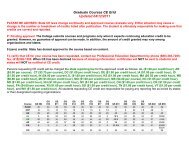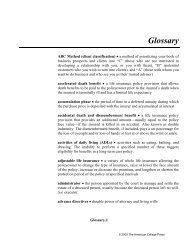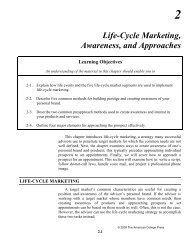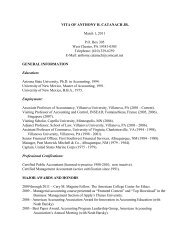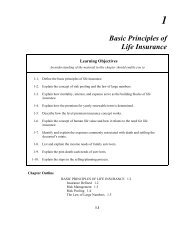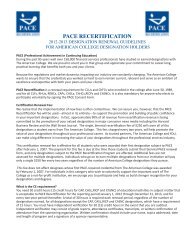- Page 1:
Huebner School SeriesHS 353 STUDY O
- Page 6:
THEAMERICANCOLLEGE.EDUThrough The A
- Page 10 and 11:
c. But it is more comprehensive bec
- Page 12 and 13:
(3) Work part-time during retiremen
- Page 14 and 15:
SECTION 2: UNDERSTANDING RETIREMENT
- Page 16:
d. Solutions(1) The model considers
- Page 19 and 20:
. Other sources of retirement incom
- Page 21 and 22:
c. Another option for solving cash
- Page 23 and 24:
(b) Net worth statements that ident
- Page 25 and 26:
d. Be ready to reengage with the cl
- Page 27 and 28:
(b) In financial planning(c) In inv
- Page 29 and 30:
j. Planning Point: Planners can use
- Page 31 and 32:
e. We also need them to have a bett
- Page 33 and 34:
Assignment 2IDENTIFY RETIREMENT INC
- Page 35 and 36:
(2) Income4. Determining risk toler
- Page 37 and 38:
collaborative experience which focu
- Page 39 and 40:
6. Asset allocation and risk tolera
- Page 41 and 42:
c. How long will the income last?d.
- Page 43 and 44:
. Durationc. Reliabilityd. Other6.
- Page 45 and 46:
c. Supplemental Security Income (SS
- Page 47 and 48:
. An unused emergency fund can supp
- Page 49 and 50:
5. Inflation(2) The expense method
- Page 51 and 52:
Assignment 3CHOOSE APPROPRIATE STRA
- Page 53 and 54:
. Save as a percentage of income an
- Page 55 and 56:
(1) Note that 38% of second income
- Page 57 and 58: (4) The AARP website has a national
- Page 59 and 60: 4. Contributions to IRAs and Roth I
- Page 61 and 62: carve out the nondeductible contrib
- Page 63 and 64: (2) Plus salary deferrals (for an i
- Page 65 and 66: a. Example:(1) Save $10,000 in 25%
- Page 67 and 68: (a) This requires knowing four fact
- Page 69 and 70: . Solution(1) Li and Lin Lin are bo
- Page 71 and 72: (1) The increase in dollar amounts
- Page 73 and 74: 9. In some circumstances, an indivi
- Page 75 and 76: 2. Reverse mortgage basicsa. Almost
- Page 77 and 78: 5. Planning considerations(b) Keep
- Page 79 and 80: (2) Some funds that are promoted as
- Page 81 and 82: (1) Berstresser, Chalmers, and Tufa
- Page 83 and 84: RESOURCES FOR COMPETENCY 3: CHOOSE
- Page 85 and 86: (2) From the previous employer(s) p
- Page 87 and 88: 8. IRA funded plans (IRAs, SEPs, SI
- Page 89 and 90: . Does the distribution election fi
- Page 91 and 92: 6. Net unrealized appreciation rule
- Page 93 and 94: a. Tax-exempt plans include Roth IR
- Page 96 and 97: 8. Calculating required distributio
- Page 98 and 99: (2) Exception: If there are separat
- Page 100 and 101: 5. Impactc. Tax rates are low in ea
- Page 102 and 103: (7) Based on ordering rules, identi
- Page 104 and 105: 7. A married couple who file jointl
- Page 106 and 107: (1) Needed to provide the appropria
- Page 110 and 111: (1) The Retirement Equity Act manda
- Page 112 and 113: (2) Beneficiary designation of bene
- Page 114 and 115: 13. Overview14. Types(2) The donor
- Page 116 and 117: (1) Charity needs only to payout in
- Page 118 and 119: c. Access should be granted to an a
- Page 120 and 121: nightmare of living probate might h
- Page 122 and 123: (6) Powers to represent their princ
- Page 124 and 125: c. If the policy is term coverage w
- Page 126 and 127: e. Factoring personal and family he
- Page 128 and 129: problem. On the other hand, we can
- Page 130 and 131: d. Adding a cost of living adjustme
- Page 132 and 133: g. Planning Point: Sometimes a high
- Page 134 and 135: (2) Clients may not be able to “a
- Page 136 and 137: c. Ensure that the client is receiv
- Page 138 and 139: a. Example: Because of physical and
- Page 140 and 141: options about where to get his/her
- Page 142 and 143: (2) Facilities, monthly fees, and s
- Page 144 and 145: 8. Other strategies that help to co
- Page 146 and 147: standard deviations of the returns
- Page 148 and 149: a collapse in the real estate marke
- Page 150 and 151: a. In a later competency we will di
- Page 152 and 153: years of service with the employer)
- Page 154 and 155: a. Planning Point: Planners should
- Page 156 and 157: (2) If you have locked in food, ren
- Page 158 and 159:
(4) Loss-of-spouse risk—Deferred
- Page 160 and 161:
(1) Excess withdrawal risk—The us
- Page 162 and 163:
(5) Frailty risk—Managing assets
- Page 164 and 165:
7. Practice good career management:
- Page 166 and 167:
Assignment 6CHOOSE APPROPRIATE STRA
- Page 168 and 169:
c. Example: Chuck and Sarah divide
- Page 170 and 171:
e. The bucket approach can be thoug
- Page 172 and 173:
3. Understanding systematic withdra
- Page 174 and 175:
(1) The time horizon used in the ca
- Page 176 and 177:
12. Four percent is not the number.
- Page 178 and 179:
markets have declined by a specifie
- Page 180 and 181:
(2) Annuities and long-term care an
- Page 182 and 183:
anticipates ramping down her activi
- Page 184 and 185:
c. Each of the three portfolios wil
- Page 186 and 187:
SECTION 4: THE ESSENTIAL VERSUS DIS
- Page 188 and 189:
d. Clients give up investment contr
- Page 190 and 191:
geared toward long-term growth. Thi
- Page 192 and 193:
. Trade-offs involve:(1) Irrevocabl
- Page 194 and 195:
(1) Rate at which banks lend to the
- Page 196 and 197:
. Dollar-denominated liabilities of
- Page 198 and 199:
(a) Dividend taxed in year paid out
- Page 200 and 201:
4. Taxationtheir return generating
- Page 202 and 203:
. Close ended(1) IPO style launch(2
- Page 204 and 205:
(3) Tax control17. Conversations in
- Page 206 and 207:
(3) Mutual funds provide lower cost
- Page 208 and 209:
way to obtain increasing payments t
- Page 210 and 211:
protection from the downside risk w
- Page 212 and 213:
6. Today’s annuitization rates ar
- Page 214 and 215:
h. Planning Point: Markets are very
- Page 216 and 217:
a. The client may not be clear abou
- Page 218 and 219:
a. Problems with implementation are
- Page 220 and 221:
c. Product solutions work together
- Page 222 and 223:
(1) A problem is that if the client
- Page 224 and 225:
(b) A traditional fund company(c) A
- Page 226 and 227:
d. Evelyn is in great health and he
- Page 228:
RESOURCES FOR COMPETENCY 7: INTEGRA





